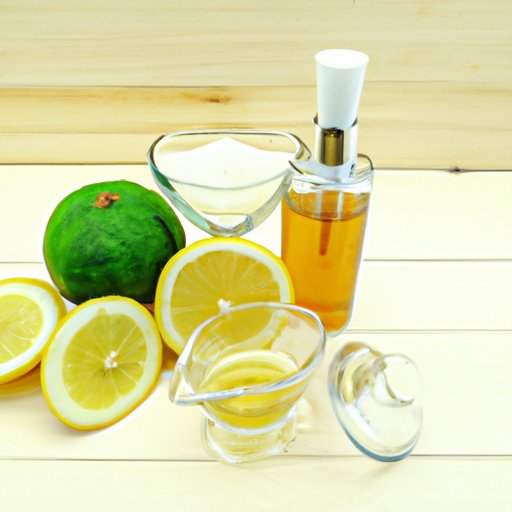
I. Introduction
Acne breakouts can be incredibly frustrating to deal with. Not only can pimples be painful, but they can also be embarrassing and hurt your self-esteem. While it may be tempting to try quick fixes such as popping pimples or using harsh chemical treatments, these options often fall short of providing a long-lasting solution. That’s why in this article, we’ll be exploring various tips and strategies for making pimples go away, so you can finally achieve clearer skin.
II. Consistent Skincare Routine
One of the most important things you can do to prevent and treat pimples is to establish a consistent skincare routine. Cleansers, toners, and moisturizers are all key components of an effective skincare routine.
When choosing products, it’s essential to consider your skin type and specific needs. For example, if you have oily skin, you may want to look for a cleanser that contains salicylic acid. If you have dry skin, a gentle, hydrating cleanser may be more suitable for you.
Once you’ve chosen the right products, it’s important to use them consistently and as directed. This means cleansing your skin twice a day, toning if necessary, and moisturizing to help keep your skin balanced and healthy.
III. Healthy Diet
What you eat can have a significant impact on your skin health, and thus, on the likelihood of getting pimples. Eating a balanced, nutrient-rich diet is essential for preventing pimples. Vitamins and minerals such as vitamin A, C, E, and zinc can play a crucial role in maintaining healthy skin and reducing the risk of breakouts.
Some foods that are particularly helpful for skin health include leafy greens, colorful fruits and vegetables, and nuts. On the other hand, processed foods and sugar can often trigger pimples. By incorporating more whole foods into your diet and avoiding sugary or processed foods, you’ll give your skin a much better chance of staying clear and healthy.
IV. Natural Remedies
Natural remedies can be a gentle and effective alternative to harsh chemical treatments for pimples. Some popular natural remedies include tea tree oil, witch hazel, and aloe vera.
To use tea tree oil, simply apply a few drops to a cotton pad and dab onto the affected area. Witch hazel can be used in a similar way. To use aloe vera, apply a small amount directly to the pimple and leave it on for at least 20 minutes before rinsing off.
It’s important to choose a natural remedy that’s appropriate for your skin type and needs. For example, if you have sensitive skin, you may want to avoid tea tree oil, which can be irritating for some people.
V. Hydration
Proper hydration is essential for overall health and wellbeing, and it can also play a significant role in preventing and treating pimples. When you’re dehydrated, your skin can become dry and flaky, which can lead to clogged pores and pimples.
Most experts recommend drinking at least eight glasses of water per day. Additionally, it’s essential to limit sugary or carbonated beverages such as soda and energy drinks, which can dehydrate you and potentially trigger breakouts.
VI. Topical Treatments
Over-the-counter topical treatments can often be a helpful tool in the fight against pimples. Ingredients such as salicylic acid and benzoyl peroxide can have an acne-fighting effect, helping to unclog pores and prevent breakouts.
When using these treatments, it’s essential to choose the right product for your needs and use them as directed. Overusing these products or applying them too often can lead to dry, irritated skin, so it’s important to be cautious and start slow.
VII. Lifestyle Changes
The state of your overall health can also play a significant role in the appearance of pimples. Stress, lack of sleep, and a lack of exercise can all contribute to breakouts and pimples.
To reduce stress, consider incorporating practices like deep breathing exercises or regular meditation into your daily routine. Getting more sleep is also crucial. Aim to establish a regular bedtime routine and stick to it as closely as possible.
Finally, regular exercise can be a game-changer for combating pimples. Exercise improves circulation, helps to reduce stress, and can also help regulate hormones, all of which can contribute to clearer, healthier skin.
VIII. Conclusion
Dealing with pimples can be frustrating, but with the right approach, it’s possible to achieve clearer, healthier skin. By establishing a consistent skincare routine, eating a healthy diet, using natural remedies, staying hydrated, utilizing topical treatments, and making lifestyle changes, you’ll be giving your skin the best possible chance to stay clear and healthy.
Remember that everyone’s skin is unique, so it may take some experimentation to find what works best for you. With persistence and patience, however, you’ll be able to overcome pimples and achieve the healthy, radiant skin you deserve.





